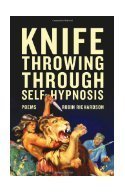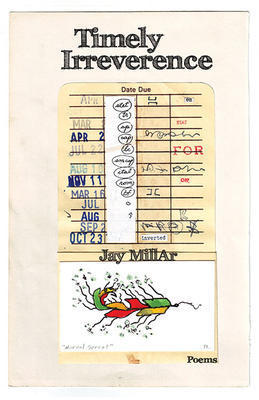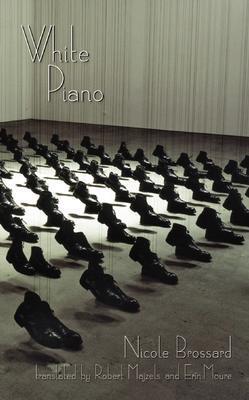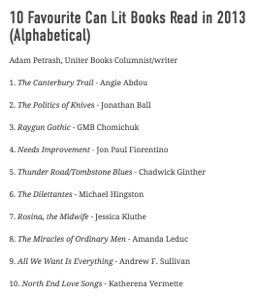Jonathan Ball's Blog, page 56
December 30, 2013
December Poetry Review Column: Adam Dickinson, Robin Richardson, Jay MillAr, and Nicole Brossard
December Poetry Review Column: Adam Dickinson, Robin Richardson, Jay MillAr, and Nicole Brossard
My monthly poetry review column is online at the Winnipeg Free Press, featuring:
The Polymers by Adam Dickinson
Knife Throwing Through Self-Hypnosis by Robin Richardson
Timely Irreverence by Jay MillAr
At the Limit of Breath: Poems on the Films of Jean-Luc Godard by Nicole Brossard (trans. Robert Majzels and Erin Moure)
Support poets, publishers, and bookstores, by buying from McNally-Robinson:




The Jay MillAr review was truncated, so here is the full review:
In Timely Irreverence (Nightwood, 96 pages, $19), Toronto’s Jay MillAr dreams of “a culture in which / People just sit around and drink beer” and “talk about stuff, like / About the things that we learn about / While we are sitting around watching / Television, or sitting around surfing / The internet.” It’s a lofty dream – what elevates the poem are two lines bookending it, each of which proffers an image of insects, in a neutral tone. A suggestion of decay, of this “dreamed” culture’s decadence? Or, rather, of hidden life beneath the surface of things?
The poems in Timely Irreverence often read like satires of poems or otherwise subvert their conventions upon closer inspection. “This stanza sucks,” writes MillAr elsewhere (that’s the whole stanza), while in another poem “two figures / sit at the edge / of the sea / contemplating / the sea itself— / they meditate: / is it a person- / ification of / the death of / the post-modern / experiment?” Timely Irreverence has a lot of fun asking and re-asking this question.
December 27, 2013
Memorable Party Planning
Your Christmas party was a disaster (admit its disastrousness!), but don’t despair. The new year offers the chance to turn your life around and your home into party central. When planning a New Year’s Eve party, you need to pay attention to all the same things that make a regular party successful — but push them to extremes, for a shindig no one will soon forget.
Music
Perhaps the most important element of a successful party is the music. You need music to set the tone, to enliven your guests, and to fill in conversational lulls that might otherwise reveal the petty, meaningless nature of human existence.
Spend time building an immaculate playlist. Don’t hire a DJ — it’s the lazy route, and you want your choice of music to reveal your personality. Craft a careful mix of danceable numbers, meditative melodies, hip “underground” rock, and flat-out party tunes.
And now for the final brushstroke, to make your masterpiece complete. About 20 songs into the party, add “Jingle Bell Rock.” With Christmas just over, and everyone still full of holiday cheer, it will be a welcome and silly way to wrap up the season and break any still-unbroken ice. Everyone will have a good laugh, smile, settle in comfortably, and enjoy themselves.
Then, after 10 more songs: “Jingle Bell Rock” resurges. Everyone will laugh again — a bit more nervously this time. A short time later: “Jingle Bell Rock” once more. Soon your guests will realize that every third song on the playlist is now “Jingle Bell Rock.” Trust me, this party and its music will be talked about for years to come.
Food
You need to feed your guests well, to prevent discomfort, people leaving to get food elsewhere, and a potential cannibal holocaust. You want party food to be light, tasty, unique, and everywhere — nobody should want for a spring roll and resort instead to a ravenous fury that threatens to dismantle your party’s vibe and/or the social contract that prevents us from murdering one another.
With party planning, as with most things in life, we can fruitfully look to celebrities for guidance. In 2008, Ashton Kutcher’s birthday party exposed his entire A-list celebrity guest list to Hepatitis A — if you similarly combine high-quality catering with some serious disease, you will have a party on your hands (and in your bloodstream) that few New Year’s Eve parties will be able to match!
Drinks
This is where it pays to go the extra mile and provide guests with the blood of young virgins.
Decorations
As far as decorations go, less is more. The days of gaudy, ostentatious New Year’s Eve parties went out with the iPad. (The what? I know — who remembers that, right?) In your decorating, you want to be tasteful, discreet, and understated.
I suggest a Conan the Barbarian theme. The ravages of war, the scantily clad men and women of war, the bravery and might of war, and the wistful tenderness of war — thoughtful, expressive themes that will both lighten the mood and also “awesome” the mood.
Leave a sword at every table! Swords are a time-honoured source of entertainment. Guests will appreciate your creativity and muscle posters, and compliment you on everything from the scantily clad servers to the scantily clad candle holders.
To speak of music once more, you might want to include (between bouts of “Jingle Bell Rock”) some songs by Austrian Death Machine, a band whose lyrics are mostly Arnold Schwarzenegger catchphrases. Might I suggest their song, “Conan, What Is Best In Life?”
Entertainment
Psychologists have discovered, after much research, that entertainment is fun. If you want to host the most memorable, amazing New Year’s Eve party, you need to sink some serious thought and even serious money into how you’re going to amuse everyone.
Karaoke won’t cut it. Your nephew’s band won’t either. You need to pull out all the stops.
I’m just going to come out and say it: human sacrifice. Your primal instincts demand it; Quetzalcoatl demands it; Cthulhu demands it; and your guests demand it. Do you want the wheat to grow next year or not?
If you go this route, don’t make the mistake that most people do: imposing on your guests. Instead, offer yourself up to the savagery of the monster gods. As the clock strikes twelve and you feel your life drain from you, know that you’ve just ended the year (and your life) with a party that will fast become legend.
December 11, 2013
John Paizs’s “Crime Wave” in the new University of Toronto Press catalogue
December 6, 2013
The Politics of Knives makes a Top 10 list, one year later
November 27, 2013
November Poetry Review Column: Sylvia Legris, Dennis Cooley, Christine McNair, and Anne Michaels & Bernice Eisenstein
My monthly poetry review column is online at the Winnipeg Free Press, featuring:
Pneumatic Antiphonal by Sylvia Legris
The Stones by Dennis Cooley
Conflict by Christine McNair
Correspondences by Anne Michaels and Bernice Eisenstein
November 24, 2013
rob mclennan on The Politics of Knives
November 16, 2013
95 Books for 2013
Ryan Fitzpatrick and I started what we call “the 95 books challenge” a few years ago, with a goal to reading at least 95 books per year (with the larger goal to become more well-read than George W. Bush). A little while back, I finished the 95 books challenge for this year, but I just realized it recently because I was remiss in writing down the books I’d read. So here is my list. Further commentary and a full 2013 list will be forthcoming at the end of this year. I did more reading than this, but I don’t count a few things, including articles and essays and books I don’t finish.
1. Redshirts (John Scalzi)
2. The Screenwriter’s Workbook (Syd Field)
3. Screenplay (Syd Field)
4. All Souls’ (Rhea Tregebov)
5. The Naive and the Sentimental Novelist (Orhan Pamuk)
6. Enter the Raccoon (Beatriz Hausner)
7. How to Write (derek beaulieu)
8. Notebook M (Gillian Savigny)
9. Hallelujah: Haiku, Senryu, Tanka (Terry Ann Carter)
10. I Can Say Interpellation (Stephen Cain)
11. Lynch on Lynch (Chris Rodley)
12. I Don’t Feel So Good (Elizabeth Bachinsky)
13. Charms Against Lightning (James Arthur)
14. Write. (Guardian Books)
15. Alien vs. Predator (Michael Robbins)
16a. Form (Mark Truscott)
16b. The Discourse of the Slave (Vanessa Place)
17. Writing 21st Century Fiction (Donald Maass)
18. The Demonologist (Andrew Pyper)
19. In Praise of Reading and Fiction (Mario Vargas Llosa)
20. The Lease (Mathew Henderson)
21. Antigone (Sophocles)
22. Take Control of Scrivener 2 (Kirk McElhearn)
23. Please, No More Poetry (derek beaulieu, ed. Kit Dobson)
24. Red Doc> (Anne Carson)
25. RUSH: what fuckan theory; a study uv language (bill bissett, eds. derek beaulieu and Gregory Betts)
26. Writing Surfaces (John Riddell, eds. derek beaulieu and Lori Emerson)
27. Booklife (Jeff Vandermeer)
28. Deluded Your Sailors (Michelle Butler Hallett)
29. Glossolalia (Marita Dachsel)
30. Moon Woke Me Up Nine Times: Selected Haiku of Basho (ed. and trans. David Young)
31. 6 (Maurice Mierau) — unpublished
32. The Zero (Jess Walter)
33. Archive of the Undressed (Jeanette Lynes)
34. How Poetry Saved My Life (Amber Dawn)
35. Yarrick: Chains of Golgotha (David Annandale)
36. Water Damage (Peter Norman)
37. In Calamity’s Wake (Natalee Caple)
38. N0S4A2 (Joe Hill)
39. Horns (Joe Hill)
40. The Ecstasy of Communication (Jean Baudrillard)
41. from Tumultétudes: The Chips & Ties Study (Margaret Christakos)
42. The Saddest Place on Earth (Kathryn Mockler)
43. The Hottest Summer in Recorded History (Elizabeth Bachinsky)
44. Avant-Garde Canadian Literature: The Early Manifestations (Gregory Betts)
45. The Wizard of Oz (Salman Rushdie)
46. Above Palm Canyon and Other Places in the Mind (Per K. Brask)
47. The Hellmouths of Bewdley (Tony Burgess)
48. Webcomics 2.0 (Steve Horton & Sam Romero)
49. Massacre Street (Paul Zits)
50. Forge (Kevin McPherson Eckhoff)
51. Supernatural Horror in Literature (H. P. Lovecraft)
52. Hooking (Mary Dalton)
53. A Spectator: Ekphrastic Poetry (Per Brask)
54. The Martian Chronicles (Ray Bradbury)
55. Moments Notice (Nico Vassilakis)
56. 1996 (Sara Peters)
57. Unknown Actor (Jason Christie)
58. i-Robot Poetry by Jason Christie (Jason Christie)
59. The Grey Tote (Deena Kara Shaffer)
60. The Last Temptation of Bond (Kimmy Beach)
61. Coping with Emotions and Otters (Dina Del Bucchia)
62. Needs Improvement (Jon Paul Fiorentino)
63. The Island of Doctor Moreau (H. G. Wells)
64. The Reinvention of the Human Hand (Paul Vermeersch)
65. Seven American Deaths and Disasters (Kenneth Goldsmith)
66. Producing Canadian Literature (eds. Kit Dobson and Smaro Kamboureli)
67. Wordpharmacy (Morten Søndergaard)
68. Poor Yorick (Ryan North, William Shakespeare, and You)
69. The Sisters Brothers (Patrick DeWitt)
70. Savage Love (Douglas Glover)
71. Cottonopolis (Rachel Lebowitz)
72. The Family China (Ann Shin)
73. North End Love Songs (Katherena Vermette)
74. Arguing with the Lake (Tanis Rideout)
75. Auxiliary Skins (Christine Miscione)
76. William Shakespeare’s Star Wars (Ian Doescher)
77. At the limit of breath: Poems on the films of Jean-Luc Godard (Stephen Scobie)
78. The Way of the Screenwriter (Amnon Buchbinder)
79. Multitudes (Margaret Christakos)
80. The Counting House (Sandra Ridley)
81. Letters of Intent (Nico Vassilakis)
82. Joseph Anton (Salman Rushdie)
83. The Iron Whim: A Fragmented History of Typewriting (Darren Wershler-Henry)
84. The Stones (Dennis Cooley)
85. Ed the Happy Clown (Chester Brown)
86. Flesh and Bone (Julia Gfrörer)
87. The Extended Dream of Mr. D (Max)
88. Fear Not (Maurice Mierau)
89. This is Importance (Gregory Betts)
90. Raygun Gothic (GMB Chomichuk)
91. The Year of Dreaming Dangerously (Slavoj Zizek)
92. Correspondences (Anne Michaels & Bernice Eisenstein)
93. Pneumatic Antiphonal (Sylvia Legris)
94. Conflict (Christine McNair)
95. Decomp (Stephen Collis & Jordan Scott)
November 2, 2013
“Jonathan Ball” — a great poem from This Is Importance by Gregory Betts
A first for me: a poem titled “Jonathan Ball” appears in Gregory Betts’s new book, This Is Importance — a collection of poetry created through a collage of “mistakes” from student essays. Betts taught Clockfire in one of his classes, and so the poem is constructed out of lines pulled from course assignments.
Beautiful and strange — like the book as a whole. The funniest book of poetry I have seen for a long, long time, and oddly brilliant. Betts’s introduction does a nice job of clarifying that he isn’t trying to make fun of students with the book, so much as recognize their unintentional genius.
October Poetry Review Column: Margaret Christakos, Sandra Ridley, Ian Doescher, and Stephen Scobie
My monthly poetry review column is online at the Winnipeg Free Press, featuring:
Multitudes by Margaret Christakos
The Counting House by Sandra Ridley
William Shakespeare’s Star Wars by Ian Doescher
At the Limit of Breath: Poems on the Films of Jean-Luc Godard by Stephen Scobie






